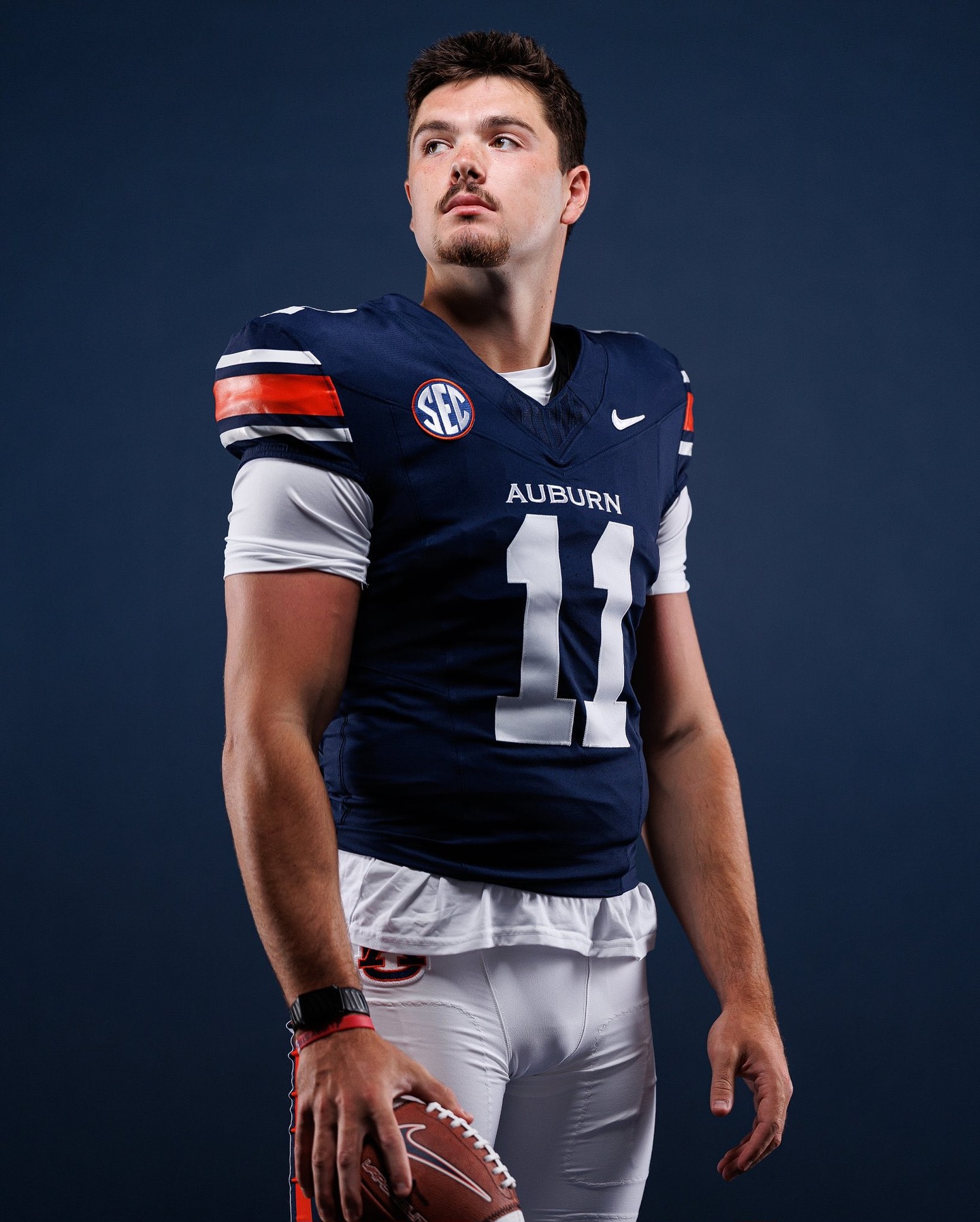As Legacy Meets Destiny: Jackson Arnold Adorns Auburn’s Iconic No. 11, Channeling Stan White’s Golden Passing Reign…
Jackson Arnold steps onto the Auburn Plains this fall wearing more than just a uniform—he steps into a legacy. He’s the first starting quarterback to don the revered No. 11 jersey since Stan White, Auburn’s all-time passing leader, guided the Tigers to greatness in the early 1990s. That number carries weight, history, and expectations. And while the pressure is real, the parallels between these two quarterbacks—separated by decades yet linked by one iconic number—makes this season one pulsating with promise.
When Auburn announced in December that it had signed Jackson Arnold, the highest-rated quarterback ever to commit to Auburn based on high-school recruiting rankings, fans and analysts alike took notice. But the quieter detail—that Arnold would be wearing No. 11—resonated with alumni and long-time supporters. That was Stan White’s number, the man who left Auburn holding the career passing yardage record at 8,016 yards—a record that still stands today.
White’s legacy at Auburn is storied. From 1990 through 1993, he started every game—45 straight—and became the representative of consistency and leadership. He captained Auburn’s undefeated 1993 team, amassing not only statistical milestones but also cementing his place in Auburn lore. His tosses weren’t just passes; they were chapter markers in a golden era. Wearing No. 11, White became synonymous with Tiger excellence.
When Arnold arrived in Auburn in January via the transfer portal, expectations came with him. Coming off two seasons at Oklahoma—where he started nine games in 2024—Arnold had compiled 1,421 passing yards, 12 touchdowns, and just three interceptions. Hugh Freeze, Auburn’s head coach, highlighted Arnold’s strengths: a powerful deep ball, instinctive RPO (run-pass option) acumen, and a gritty, dual-threat mentality. Those traits, Freeze suggested, would inject swagger and dynamic creativity into the Auburn offense.
One could imagine the echoes when Arnold laced up in the same number White wore with distinction. The choice was less a gimmick and more a tribute—a baton passed across time in the form of stitches and threads. After all, no Auburn quarterback had embraced No. 11 as a starter since White left the field in 1993. That Arnold, a quarterback with a national-level pedigree—Gatorade National Player of the Year, Elite 11 Finals MVP, and five-star recruit—would claim that number, felt meant to be.
It’s not lost on Auburn faithful that White’s career totals still anchor the record books, while Arnold arrives touted as a generational prospect—situated between glories past and hopes of future triumphs. The symbolism runs deep.
On media day in July, Arnold spoke candidly about his arrival. Auburn was “a fresh start,” he said. The team, the coaches, the culture—it all aligned for him. Wolfe-Pass-Option schemes, vertical passing, an energized room—he was home. And the fact that Auburn was the first school to contact him when he entered the transfer portal? That spoke volumes.
Through spring and summer practices at the Woltosz Football Performance Center, the image of Arnold wearing No. 11 became commonplace—but powerful. The work ethic. The chemistry. The leadership. Auburn’s media captured it. His teammates voted him to the leadership council. The swagger? It was organic.
In the fall, when Auburn opens the season in Texas—at Baylor—Arnold returns to the Lone Star State, where his standout high school career was forged. And on September 20, the Tigers face his former school, Oklahoma. It’s cinematic: the No. 11 quarterback, once a star in the red and white Sooners of Norman, now quarterbacking his new destiny in orange and blue—dripping in history and expectation.
What does this all mean? At some level, it’s a nod to Auburn’s identity—a reminder of its traditions and triumphs. White’s No. 11 was a beacon of excellence, calm command, and winning pedigree. Can Arnold channel that? His tools suggest yes: dual-threat explosiveness, deep ball accuracy, mobility, RPO mastery, toughness on the run, and a winning mindset that even delivered big against Alabama in 2024.
Will he break records like White did? Time will tell. But Arnold doesn’t have to—not to wear the number proudly. Even in practice, his presence has galvanized the offense. Chemistry with receivers. Spring’s efficient sessions. The leadership council nod. Fans have already glimpsed a new identity for Auburn’s offense—a hybrid of white-knuckled determination and play-making flair.
The tapestry of Auburn football is rich. Bo Jackson’s No. 34. Pat Sullivan’s No. 7. Terry Beasley’s No. 88. But No. 11? That’s Stan White’s domain—a place seldom touched since he walked the Plains in the early ’90s. Now, that space is filled by Arnold. And the question is not just whether Arnold will succeed—for he already has. It’s whether he’ll leave a mark, build a legacy, or at least bridge a glorious past to a hopeful tomorrow.
Perhaps this season’s story will hinge on that bridge. Auburn fans will watch a young quarterback in No. 11 stride into the pocket, eyes scanning, with White’s passing yard record standing behind him like a silent sentinel. The number is a whisper of legacy—but in Arnold’s hands, it might become a roar.
So here’s the season ahead: Jackson Arnold, carrying No. 11—the weight of history, the promise of talent, the hope of Auburn’s future. If Stan White’s success was the template, Arnold’s opportunity is the next chapter. Let the season begin.



